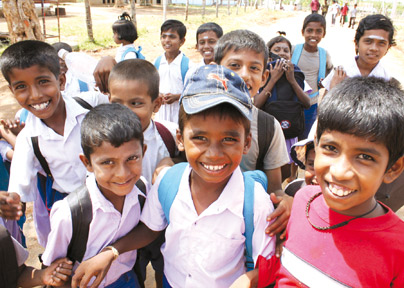|
Responsibility to Protect :
Conspiracy against sovereignty
Ajit RANDENIYA
An article in the Sri Lankan English media
on April 26 by Radhika Coomaraswamy refers to the idea of Responsibility
to Protect (R2P) being promoted by the United States (US) at the United
Nations (UN) forums as ‘a natural humanitarian impulse’. The purpose of
this article is to argue that the R2P is just another pretext to justify
neocolonialist attempts to intervene in the domestic affairs of
developing countries, and to draw attention to what Coomaraswamy refers
to as an ‘international conversation’ the International Centre for
Ethnic Studies (ICES) wanted to be part of.
A review of the history of the R2P campaign over the last two decades
shows that it is nothing but a carefully orchestrated series of
deceptive attempts by a coterie of US ‘think tanks’ and INGOs to force
this dangerous ideological tool on the UN, resisted vigorously and with
the highest level of skepticism and disdain by the wider membership of
the UN; they view it as the nearest imperialist contraption to the 15th
Century Papal Bulls that rationalized the subjugation of Indigenous
peoples around the globe.
History of the R2P concept
The R2P idea emanated from a Washington DC based now defunct, dubious
think tank known as the Refugee Policy Group (RPG) aligned with the
Brookings Institution’s ‘Brookings-Bern project’; this collaborative
project with the Bern University is cause for concern in the context of
the history of the Brookings Institution.
 |
|
IDP
children, away from the LTTE threat. File photo |
In the early 1990s, the RPG initiated a concerted thrust to place on
the global agenda the premise that the human rights of IDPs were being
neglected. The neglect, it was claimed, was due to the reluctance of a
small group of ‘international community’ to attempt to intervene in
domestic affairs of other countries due to concerns about violating
their sovereignty. Logically, the debate and international attention was
next being drawn to the inappropriateness of the concept of sovereignty
in today’s world.
The RPG of the Brookings-Berns ‘project’ in the late 1980s and early
1990s seemed to have been backed by unlimited financial resources, and
was being spearheaded by three individuals: Francis M. Deng, Roberta
Cohen and later, Professor Walter Kalin. Francis M. Deng, the founding
employee of the RPG project is a former Sudanese politician and
diplomat, and later UN employee with a long history of involvement in US
think tanks: he was the first ‘Rockefeller Brothers Fund Distinguished
Fellow’, and has held senior fellowships at the so-called ‘United States
Institute of Peace’ in 2002 and 2006; Roberta Cohen who still serves as
a ‘guest scholar’ at Brookings appeared to be Deng’s ‘handler’ in many
ways; Richard Holbrook, the leading neocon and then US Ambassador to the
UN, referred in jest to Deng and Cohen as Mr and Mrs IDP.
In 1990, Deng and Cohen, representing the RPG and a collective of
other NGOs, pressurised a special meeting of delegates of the UN
Commission on Human Rights (UNHCR) ‘to take measures to protect the
human rights of IDPs as part of assistance provided to them’. Deng
argued that when governments do not have the willingness or ability to
protect their displaced populations, the international community faces a
major ‘responsibility to protect’ them [emphasis added]. They campaigned
hard to push their ‘doctrine’ to the top of the global human rights
agenda and engaged aggressively and often discourteously in the case of
Cohen, against naysayers.
Internal displacement
Their objective appeared to be to force the UN Human Rights
Commission to place ‘internal displacement’ on its agenda and more
importantly, ‘to create a mechanism for international response’. They
demanded specifically that the UNHCR develop a conceptual and legal
foundation similar to the Refugee Convention on which to base their
growing involvement with IDPs and the Secretary-General appoint a
‘representative’ of the for IDPs.
The international community responded with Resolution 42/182 ‘On
humanitarian assistance in emergencies’, adopted at the 1991 General
Assembly, clearly stating that aid should be provided ‘with the consent
of the affected country, on the basis of an appeal by the affected
country’.
Unrelenting pressure on the UNHCR and the then Secretary General
Boutros Boutros-Ghali finally resulted in Deng being appointed
‘Representative of the UN Secretary-General on Internally Displaced
Persons’ in 1994. Deng held this position until 2004 when the position
was transferred to Walter Kalin, the Bern half of the Brookings-Bern
project. Throughout this period Roberta Cohen served as principal
adviser to the Representative.
Deng’s work as the secretary general’s ‘Representative’ essentially
involved fruitless, yet never ceasing attempts to convince skeptical
developing country governments that the US ‘concern for IDPs’ was not a
pretext for their political or military involvement in other country’s
affairs.
In 1998, Deng introduced ‘The Guiding Principles on Internal
Displacement’ to the UNHCR. The principles drafted by Deng appeared to
be an attempt to assuage concerns of the developing world by recognizing
that the welfare and safety of IDPs is primarily a matter for their
Governments, yet reserving the ‘gateway’ for intervention: Deng’s
principles laid out the conditions that when governments are unable to
fulfill their responsibilities, they ‘should’ request and ‘accept’
offers of aid and if they refuse, the international community has a
right and a responsibility to take action ranging from ‘diplomatic
efforts to political pressures, sanctions, or, military intervention.’
To be continued
|



